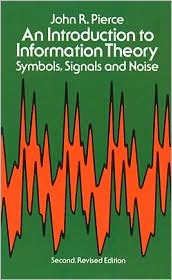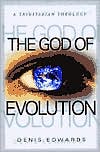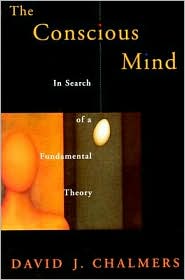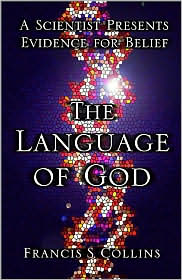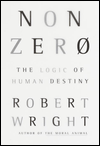
I've been inquiring into an argument Robert Wright presents in his book
Nonzero: The Logic of Human Destiny to the effect that Darwinian natural selection could not have crafted human consciousness. Wright holds that our inner, subjective experience of the events going on in our brains is the cause of
nothing that happens in the physical world. When it comes to mental abilities, cognition is causal, consciousness isn't. If we were zombies with no sentience whatever, we'd be just as fit, evolutionarily speaking, since our behavioral functionality would be no different.
Yet it is our sentience which gives us the moral standing we customarily ascribe to ourselves, such that for one of us to take another's life is murder. It is sentience which gives our lives value and meaning. It is sentience which makes our religions make sense. In an alternate world inhabited by nothing but zombies, if the denizens had a God at all, he or she would be much, much different: a God of pure utility, not a God of ethics and morals.
Thus, according to Wright, "the hard-core scientific view that consciousness is a mere epiphenomenon, lacking real influence" (p. 307) can tell us why it is that we live in a
meaningful world. How it comes about, that is, that our world is not one of evolutionarily fit robotic zombies that "lack the kinds of things many people cite as key sources of life's meaning: such feelings as undying love, devout allegiance, unmitigated triumph, and so on. ... Such a world would lack
moral meaning ... [and] offer no context in which words such as 'right' and 'wrong' made sense" (p. 321).
Given the moral meaning present in our lives and world, and given that our sentience seems to have been merely a
byproduct of evolution's apparent directionality in favor of increasing biological complexity — a directionality which traditional Darwinists dispute, it should be noted — Wright says that it's a "non-crazy question" to ask if there is, after all, a God. Complexity is associated with intelligence, intelligence with cognitive fitness, and (in some way not clearly stated by Wright) cognition with consciousness. If God wanted conscious creatures, he might accordingly have simply trusted evolution to produce them. We don't need to assume he made them directly out of nothingness.
 When Wright calls our sentient inner experience
When Wright calls our sentient inner experience "a mere epiphenomenon," he's drawing partly on (and somewhat oversimplifying) the view of consciousness proposed by philosopher David J. Chalmers in
The Conscious Mind: In Search of a Fundamental Theory.
I have dipped into Chalmers's book and found it, admittedly, tough sledding. It's basically written for other professional philosophers and talks about notions most of us have had little exposure to. For instance, it is crucial to the argument Chalmers makes that the relationship between consciousness and the physical brain be deemed one of
supervenience.
Say, what?
According to Chris Eliasmith's
Dictionary of Philosophy of Mind, "A set of properties or facts M supervenes on a set of properties or facts P if and only if there can be no changes or differences in M without there being changes or differences in P." Here, M is the mental set of properties/fact, P the separate physical set. Included in M are those properties/facts that constitute consciousness, along with possibly other mental properties/facts. The M facts supervene on the P facts, in the view of Chalmers, such that you can't change anything about M while leaving the physical substrate, P, wholly unchanged.
Thus, on this view, mind (specifically, the
conscious mind) can never achieve independence from brain. Turned around, this view supposes that certain organizational functionality at the level of the brain (or of any other physical substrate) is
always associated with consciousness.
But is this supervenience of consciousness on the physical, organizational functionality of the brain a matter of absolute necessity? Another way of asking that question is to wonder if there could ever be a zombie world Z in which there is zero consciousness, despite the same organizational functionality in the physical substrate.
If zombie world Z were
impossible, it would be because there is a
metaphysical necessity involved in the link between organizational functionality and consciousness. But Chalmers claims the necessity here is only a
nomic one, meaning that it stems from laws of nature in
our world that might not apply to a hypothetical zombie world Z. (See the glossary of technical terms which is downloadable in PDF format
here for definitions of "necessity, metaphysical" and "necessity, nomic.")
Thus, the relationship that says that the complex organizational functionality of our human brains necessarily yields the consciousness we know is not
logically absolute, in Chalmers's view. The supervenience involved is a
natural one, not a metaphysical one. This "natural supervenience" is Chalmers's conclusion based on a lengthy line of argumentation which I admittedly have skipped over. If he is right, he opens the door to Wright's "non-crazy question" about the existence of God.
For if there is some absolute, could-never-be-otherwise, metaphysical tie among high organizational complexity, intelligence, and consciousness, then a zombie world, however readily we might be able to imagine it if we try, would be impossible. Our world, in which consciousness pops out wherever there is sufficient functional complexity, would the only type of world that there could be — since metaphysics is the study of
being per se and its possibilities and impossibilities.
Thus, a metaphysical supervenience of consciousness on the physical world would cut Wright's (and Chalmers's) argument off at the knees. But a merely nomic or lawful supervenience of the sort that Chalmers proposes immediately opens the door to Wright's "non-crazy question" about God.
Not that this is Chalmers's intent. Chalmers, in fact, states in his introduction, "I am strongly inclined toward materialist reductive explanation, and I have no strong spiritual or religious inclinations" (p. xiv).
His book is basically an intellectual explanation of why he feels compelled to abandon the "materialist reductive explanation" for consciousness which the first clause in the above compound sentence addresses. "Materialism is a beautiful and compelling view of the world," he elaborates, "but to account for consciousness, we have to go beyond the resources it provides. ... I argue that there is good reason to believe that
almost everything in the world can be reductively explained; but consciousness may be an exception" (pp. xiv-xv).
Chalmers is accordingly no materialist. To an orthodox materialist, the variation on
dualism which Chalmers proposes is wholly out of bounds. Chalmers has it that consciousness, though not a part of the physical world, definitely
exists. It supervenes on the physical world, true, but it is not itself physical.
Materialism, contrariwise, holds that everything that actually exists is material or physical.
Which means that a materialist must consider consciousness to be nothing more than an illusion, or, at best, to be
identical with the physical entities and events that Chalmers takes to be but consciousness's substrate. Chalmers, as a dualist though, "takes consciousness seriously" (see p. xii). He says that, beyond scientific explanations for "the processes of discrimination and action," there is yet another "something that needs explaining." That something is consciousness itself.
It accordingly seems fair to say that Chalmers intends his book as nothing more than a bold claim in favor of "naturalistic dualism" (his chapter 4 title) and against materialism. It is not a plea for anything like theism, the belief that there is a God. Thus, the second clause in the compound sentence cited above ("I have no strong spiritual or religious inclinations") is not violated by anything Chalmers says.
It is Wright who extends Chalmers's claim into a "non-crazy question" about God. In so doing, he somewhat glosses over a subtle distinction which Chalmers himself dwells on at some length: "Is This Epiphenomenalism?" (title of Chalmers's chapter 4, section 4).
Consciousness, in the view of it which Chalmers earlier works out, "seems to be a mere epiphenomenon, hanging off the engine of physical causation, but making no difference in the physical world" (p. 150). Sentience, then, "seems to lack causal efficacy" in a "physical world [that] is more or less causally closed."
But Chalmers finds such a conclusion "unpalatable," largely because it is so counterintuitive. He struggles to locate ways of avoiding it. However, he quickly dismisses strategies for doing so that "deny the causal closure of the physical [and] embrace a strong form of interactionist dualism in which the mental fills causal gaps in physical processing" (p. 151). Such an approach would violate one of the foundational constraints he lists in his introduction — "to
take science seriously" (p. xiii) — in that science cannot abide causal gaps.
Thus, the four strategies which Chalmers lays out (pp. 151-155) for avoiding unpalatable epiphenomenalism amount to what he acknowledges is "metaphysical speculation" (p. 155). Suffice it to say that, for very tenuous, gauzy reasons, he feels "the issue of epiphenomenalism is not cut and dried." Yet, he writes:
It remains the case that natural supervenience [i.e., that of consciousness on the physical world] feels epiphenomenalistic. We might say that the view is epiphenomenalistic to a first approximation; if it allows some causal relevance for [conscious] experience, it does so in a subtle way. I think we can capture this first-approximation sense by noting that the view makes experience explanatorially irrelevant. We can give explanations for behavior in purely physical or computational terms, terms that neither involve nor imply phenomenology [i.e., subjective or phenomenal experience]. If experience is tied in some intimate way to causation, it is in a way that these explanations can abstract away from. (p. 156)
Clearly, Robert Wright has pretty much ignored this admittedly nice distinction between explanatory irrelevance and true epiphenomenalism. His point is that, either way, natural selection is
blind to consciousness. Darwin's mechanism by which a plethora of candidate life forms are inevitably winnowed down to just those which are evolutionarily fittest must pick and choose solely on the basis of heritable characteristics which are causally relevant ... not something like consciousness that merely "hangs off the engine of physical causation."
I personally consider Wright's argument to that effect quite a compelling one, though perhaps not ironclad. One of the reasons I am not
totally convinced has to do with the third of David Chalmers's four candidate loopholes against epiphenomenalism. He calls it "the nonsupervenience of causation" (p. 152), by which I imagine he means that conscious experience may play a causal role more like a motorcycle's engine and less like that of, say, its sidecar.
How? "[I]t may be that experience
realizes causation, or some aspects of causation, in the actual world. On this view, causation needs to be realized by something ... [such that] it is the very existence of experience that allows for causal relations to exist ... " (p. 152).
This sort of view reminds me of something that physicist John A. Wheeler has seemingly established about quantum phenomena: that the mere act of observation can decide which of two equiprobable quantum possibilities actually happened, a long time ago in the past! (Physicists differ about whether the "observation" needs to be made by a sentient creature like us, or whether passive, robotic recording devices serve just as well.)
At any rate, that quibble about experience realizing causation is neither here nor there. Whether consciousness is epiphenomenal in a strong sense, or merely "to a first approximation," it would seem that natural selection must be blind to it. So how might the existence of consciousness be accounted for?
Some theists might suppose that God reaches between causal "gaps" in a world that is anything but "causally closed." He thereby
imposes consciousness on those creatures which evolution has independently produced and which accordingly have the apparatus to sustain it, by virtue of their mental complexity and functional organization.
That supposition is not, however, anything that is implied or stated in Wright's discourse ... and it goes right against Chalmers's foundational assumptions. Chalmers is forced by those very presuppositions to suppose, accordingly, that it is
natural laws that undergird
... an "organizational invariant": that is, that every system with the right functional organization will have the same sort of conscious experience, no matter what it is made of. (p. xv)
Indeed, this view of organizational invariance patterns with Wright's prognostication that precisely such a functional organization is imminent on a worldwide scale, as our communications technology is turning the planet into some sort of "superorganism" with interconnected
us as its "superbrain."
If we combine Wright with Chalmers, then, here is what apparently is going on. Evolution by natural selection has produced us, a highly complex species with bodies/brains that are functionally organized substrates for consciousness. After our arrival on the scene, we then invent culture ... which proceeds to evolve by similar principles. In both biological and cultural evolution, Wright's vaunted "non-zero-sumness" provides a directional arrow toward more and deeper complexity. And so the planet itself may just possibly be growing incipiently conscious as well.
Which, even if you don't think such a thing as a global "superorganism" is truly in the offing, gives the world — and us in particular — a moral dimension, meaningfulness, and definite grounds for our believing there may be a God.
If our type of complex functional organization is bound by some natural law to produce consciousness along with morality and meaningfulness, then that's
even more reason to think that God, the divine proclaimer of all natural laws, is real. Remember, if there were an absolute
metaphysical connection between organizational complexity and consciousness, God could conceivably be thrown out of the picture. But if the complexity-consciousness connection is only
nomal or law-based, as Chalmers says it is, then the situation could have been otherwise. We live in a world, manifestly, where it is
not otherwise. That fact, all by itself, speaks for God.
Now, a personal speculation as to why I think many believers in God wouldn't be happy with this sort of argument in favor of God's being real. Such an argument strongly suggests that it is
nature that, however tardily, eventually realizes God's will. God doesn't have to impose his will on the world by reaching through "gaps" in worldly causality. Instead, the world itself is
progressive. If left to its own devices, it will eventually produce what God intends.
Implicated in this worldly progressiveness is natural law: to wit, a law — or laws, plural — of nature which reliably transmutes a certain kind of functional organization at the physical level into consciousness, and thus into meaningfulness, and thus into an implicit moral dimension of the cosmos.
Also implicated in the world's inherent progressiveness is the scientific validity of the theory of evolution by natural selection ... especially when the process is writ large to include cultural evolution as well as biological. Because it ultimately favors the playing of "non-zero-sum," cooperative, win-win games, evolution has hidden directionality. This directionality might be construed as reflecting
yet another natural law which reliably produces the "certain kind of functional organization" alluded to above.
To a lot of theists, it's hard to suppose that a "fallen" world such as ours supposedly is could also be the instrument of working out God's will. In a progressive world, Mother Nature can be thought of as God's "handmaid," as it were.
To many believers, God, to
be God, must be imagined to act in the world to alter worldly outcomes ... to censure, upbraid, and correct what would otherwise be the world's evil ways and unholy results. Thus a personal belief in miracles that defy natural laws is often the stuff of faith.
For many believers, that is, every intercessory prayer is effectively a plea for an extraordinary intervention on God's part, one that will reverse and rebuke nature. A prayer that a cancer can be miraculously cured falls in this category. For such believers as these, prayer as an affirmation that a natural domain in which cancer
happens can still be God's slow-but-sure handmaid makes no sense.
Believers who are skeptical of natural "progress" don't want to hear about a God who relishes it. One reason is this: if God places faith in the laws of nature he himself established, and if he is willing to play be the rules of a "causally closed" world with no "gaps" through which to "reach in" and impose his intentions directly, then we would seem to be called on to be theologically and ideologically progressive as well. If the world is to be made better, then we must do it ourselves.
 This view of things certainly won't sit well
This view of things certainly won't sit well with the hard Christian right, either. The Christian right seems to prefer old-style creationism or its trendy follow-on, Intelligent Design. William A. Dembski's book by that name claims that laws of nature ("necessity") cannot possibly explain the staggering complexity manifested by organisms on this planet. Even taken in tandem with random mutations ("chance"), the natural laws which Chalmers would call "nomic necessity" cannot create "complex specified information," says Dembski. CSI can be explained only by supernatural design.
If Dembski's argument is correct — and I don't think it is; see, for example,
Is Fitness a "Specification"? (I.D. XXII) for why not — then it leaves us with no choice but to believe in God. That is, it purports to be a
conclusive argument that there is an Intelligent Designer, a.k.a. God.
The view of things I am alluding to here doesn't claim that it's a conclusive argument in God's favor. After all, it has several controversial layers. Some people will object to Wright's attribution of directionality to evolution. Some, to his belief that consciousness qua consciousness exists, is causally irrelevant, and accordingly cannot be accounted for by Darwinian theory. And some, to his extending the causal irrelevance of sentience into the vexed realm of meaning and morality, wherein the idea of God is a "non-crazy question."
It almost seems as if any worldview that interposes natural law between divine intentions and earthly results is bound to generate arguments-in-God's-favor which are highly suggestive, but far from conclusive. Perhaps that's one big reason why the Christian right prefers Intelligent Design.
 The text mentioned in the statement, Of Pandas and People: The Central Question of Biological Origins, is a recent book by Percival Davis and others which proposes an "intelligent cause" as a better explanation of the origin of species than Darwin's. It is compatible with the Intelligent Design movement.
The text mentioned in the statement, Of Pandas and People: The Central Question of Biological Origins, is a recent book by Percival Davis and others which proposes an "intelligent cause" as a better explanation of the origin of species than Darwin's. It is compatible with the Intelligent Design movement.















